Mileage fee programs go by different names. In the West, it's the road usage charge or RUC. Oklahoma adopted a simpler term. What most have in common, though, is the for-profit company helping to manage them.

As the number of electric vehicles increase on America's roads, legislators and state transportation officials are recognizing the need to find an alternative or additional revenue source for vehicles that pay no fuel taxes. Christopher Carey, mobility editor for the global magazine, Cities Today, reports on the nation's latest mileage fee program in Oklahoma.
“Oklahoma’s Department of Transportation is inviting drivers to take part in a six-month pay-per-mile pilot progamme set to launch this July,” writes Carey on May 2.
The department is working with toll-based mobility solutions provider Emovis on the Fair Miles programme to assess the benefits and identify potential hurdles.
Emovis, part of Albertis Mobility Services, a 'motorway management' company operating in 15 countries across Europe, America and Asia, specializes in 'traditional tolling,' as opposed to the much newer mileage fee programs that are often referred to as road usage charges, mileage-based user fees and vehicle miles traveled (VMT) fees.
Oklahoma joins four other states that have previously rolled out the Emovis pay-per-mile solution: Oregon, Utah, Virginia and Washington.
The first three states have the nation's only mileage fee programs in operation, to this correspondent's knowledge. Other states, including Washington, have conducted pilot programs, but ongoing programs are few. Oregon's stands out as the oldest, having been launched in July 2015. All are voluntary and have relatively low participation.
“The Oklahoma state legislature mandated the study in 2021 as guidance for future policy changes,” adds Carey.
Fair Miles
“Drivers who volunteer to be part of the pilot through the Fair Miles Oklahoma website will have several mileage reporting options (MRO), including an onboard device (OBD-II) and telematics, if provided by the vehicle manufacturer,” adds Carey. “The state is looking for 500 diverse participants, who will each be paid US$50 for taking part.”
The website's FAQ revealed interesting and to this correspondent, possibly contradictory information on the current form of transportation funding that the pay-per-mile program is aiming to replace.
- Why not just raise the fuel tax?
This would only be a short-term solution as vehicles become more fuel efficient. Also, fuel tax is not levied on alternative fuels or electric vehicles, contributing to the long-term challenge of maintaining a fuel tax model. -
How much is Oklahoma’s fuel tax?
Oklahoma’s fuel tax is 20 cents per gallon for gas and diesel – only four other states have a lower fuel tax. The average state fuel tax in the United States is 37.55 cents per gallon. Federal fuel tax, paid on top of the state’s fuel tax, is 18.4 cents per gallon for gas and 24.4 for diesel.
Why not do both, i.e., hike the fuel tax to the national average and apply the mileage fee to those vehicles that pay no fuel taxes? In fact, that's the basis of the Utah program – only motorists who drive “fully electric vehicles” are eligible to participate.
[Related: Utah Officials Want to Replace the State Gas Tax, March 3, 2020]
Like most pilot programs, Oklahoma drivers who enroll in Fair Miles won't be charged the mileage fee, which will be simulated. The mileage rate has yet to be determined. For comparison, Oregon's rate is 1.9 cents-per-mile and Utah's is 1.00 cents. The Virginia Mileage Choice website does not appear to indicate the fee.
“Upon completion of the pilot, the Oklahoma DOT will draft a comprehensive report for state lawmakers, which will describe the results and lessons learned for future policy decisions,” notes the April 26 press release by Emovis.
FULL STORY: Oklahoma pilots pay-per-mile programme

Trump Administration Could Effectively End Housing Voucher Program
Federal officials are eyeing major cuts to the Section 8 program that helps millions of low-income households pay rent.

Planetizen Federal Action Tracker
A weekly monitor of how Trump’s orders and actions are impacting planners and planning in America.

Ken Jennings Launches Transit Web Series
The Jeopardy champ wants you to ride public transit.

California Invests Additional $5M in Electric School Buses
The state wants to electrify all of its school bus fleets by 2035.

Austin Launches $2M Homelessness Prevention Fund
A new grant program from the city’s Homeless Strategy Office will fund rental assistance and supportive services.

Alabama School Forestry Initiative Brings Trees to Schoolyards
Trees can improve physical and mental health for students and commnity members.
Urban Design for Planners 1: Software Tools
This six-course series explores essential urban design concepts using open source software and equips planners with the tools they need to participate fully in the urban design process.
Planning for Universal Design
Learn the tools for implementing Universal Design in planning regulations.
Ada County Highway District
Clanton & Associates, Inc.
Jessamine County Fiscal Court
Institute for Housing and Urban Development Studies (IHS)
City of Grandview
Harvard GSD Executive Education
Toledo-Lucas County Plan Commissions
Salt Lake City
NYU Wagner Graduate School of Public Service




























